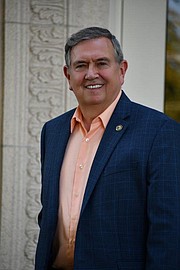Voting? Leave the MAGA hats and Biden buttons home
If you’re planning on voting in person, showing your political preference could mean breaking the law.
Electioneering at the polls — including early voting polling places — is prohibited by Idaho Code section 18-2318, punishable by a fine not exceeding $1,000 and possible arrest.
That means any act considered electioneering will not be allowed inside or within 100 feet of an election building.
Idaho’s vague definition of “electioneering” has stirred up trouble in Kootenai County, as clerk Jim Brannon has determined that any candidate-referencing or political garb will not be permitted at or around polling places.
Brannon’s execution of the law led to Adams County prosecuting attorney Christopher Boyd receiving questions on the legality of the interpretation, so he reached out to the state attorney general’s office.
Ada and Harris counties have also recently reported the prohibition of wearing political apparel in and around polling locations. For Brannon, this is another way of protecting voters.
“My interpretation is to respect other peoples’ opinions,” he said. “Quite honestly, if someone has a MAGA hat or Biden button, it is not appropriate. You cannot wear it here.”
A few instances of voters donning politically related clothing did occur this week, Brannon said, but they ended amicably. However, he warned that if someone does persist, he is not afraid to take action.
“If someone wants to do that, they are committing a crime, and I will not mess around. I’ll prosecute anybody,” Brannon said. “If they are asked nicely, and they choose not to, I can’t impede their right to vote, but I can sure as heck refer them to the county prosecutor.”
This is an extreme action Brannon and Deputy Secretary of State Chad Houck hope to avoid. When Adams County requested the attorney general opinion, the SOS was also sent a request, Houck said, but the SOS defers to the AG when it comes to the statute.
The statute leaves itself open to interpretation, Houck said, denying electioneering but not defining it in detail. As determined by Idaho Code 18-2318, the act of electioneering describes the circulation of cards or handbills, solicitation of signatures, obstruction of polling place entries and the engagement of any practice which “interferes with the freedom of voters to exercise their franchise or disrupts the administration.”
Some states have specifically restricted apparel that endorses a political candidate, including California, Texas and Vermont. However, states like Iowa and Maine allow for varied political attire.
Idaho’s electioneering communication definition includes anything that unambiguously refers to any candidate and is “broadcast, printed, mailed, delivered, made or distributed within 30 days before a primary election or 60 days before a general election.”
“So is wearing a printed T-shirt or button electioneering? We don’t know until the courts tell us one way or another,” Houck said. “Even with the AG, it is only an interpretation of a law, so when someone brings a case, the decision will then become case law which is then the precedent and often statute moves to precedent.”



